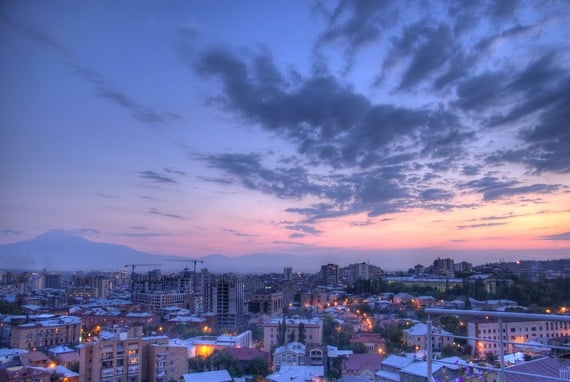Armenian President’s U.S. Visit to Include Meaty Topics Such as Proliferation

Armenian President Serzh Sargsyan is spending three days in the Boston area, home to one of America’s oldest ethnic-Armenian communities, before taking part in a nuclear summit in Washington on Thursday, the Huffington Post reports.
Sargsyan, who arrived in Boston on Monday, is attending Armenian-community events and visiting landmarks such as the Armenian Holy Trinity Church in Cambridge and the Armenian Heritage Park, where he will lay a wreath in honor of Armenian Americans.
Armenians in the homeland and in the huge overseas diaspora are applauding Sargsyan’s U.S. visit, which has the potential to improve Yerevan’s relationship with Washington.
Both the United States and the European Union are still smarting from Sargsyan’s decision in the fall of 2013 to scrap an Armenian commitment to a trade-association treaty with the EU in favor of membership in the Russian-led Eurasian Economic Community.
The turnabout came under intense Russian pressure — in fact, strong-arming from the president of Russia himself, Vladimir Putin. Sargsyan announced that Armenia was joining the Eurasian Economic Community only hours after a meeting with Putin in Moscow.
The about-face sparked nationwide protests in Armenia from those who thought the country had a better chance to improve its standard of living by looking toward the West rather than continuing to rely on Russia.
Although the vast majority of Armenians are hailing Sargsyan’s American visit, many are hoping U.S. officials obtain pledges from him to do a better job of combating corruption and addressing human rights violations in Armenia.
Armenians and Armenian Americans are also hoping that Sargsyan’s trip leads to stronger trade and investment ties between the countries. Russia has a stranglehold over Armenia’s economy — owning its natural gas and electric systems, for example.
The Russian owner of the electric system’s announcement in the summer of 2015 that it would be raising Armenians’ rates by 17 percent led to nationwide protests.
Sargsyan calmed Moscow’s fears that the demonstrations would spark a color revolution in Armenia by employing the stop-gap measure of having the government cover the rate increases for awhile. In making that announcement, he told the country that the increases would have to take effect in the near future, however. Nine months later, the issue remains unresolved.
Sargsyan will be one of 56 heads of state and other officials taking part in the nuclear summit that President Barack Obama is convening in Washington on Thursday.
Obama typically has one-on-one meetings with important heads of state who attend the summits. Armenia may be too far down in the pecking order for Sargsyan to have a closed-door session with the American president, however.
This year’s summit, one of a series the United States has sponsored in recent years on nuclear nonproliferation, will focus on how countries can better secure nuclear materials.
A conspicuous absence at the summit will be Russia, which sloughed off Obama’s invitation, presumably because of the current strife between Russia and the West.
Although Armenia has no nuclear weapons, it does have a nuclear power plant. Criminal elements would love to get their hands on material from either nuclear weapons or nuclear plants that they could sell to terrorists wanting to make a dirty bomb.
The issue of securing nuclear material became more urgent when those investigating the recent Brussels terrorist attacks discovered that some of the terrorists had been tracking the movements of a Belgian nuclear-power official.
Investigators surmised that the terrorists were planning to kidnap the official in a bid to force him to give them material for a dirty bomb.
The question of criminal elements in the former Soviet Union stealing nuclear materials to sell to terrorists surfaced in dramatic fashion in October of 2015 in Moldova.
News reports that month indicated that Moldovan authorities and the FBI had conducted sting operations that had derailed Russian criminal gangs’ attempts to sell nuclear materials four times over a five-year period.
The gangs were planning to sell the materials to ISIS, authorities said.
Moldova has no nuclear weapons or nuclear plants, so the material that the Russian gangs were trying to sell presumably came from Russia.
The West worries that criminal elements in countries across the former Soviet Union that have nuclear weapons or nuclear plants, including Armenia, will continue trying to obtain nuclear materials to sell to extremists.
Although there are no indications yet that criminals have tried to obtain nuclear materials in Armenia, the country’s status as one of the region’s poorest nations makes it susceptible to such an attempt, Western experts worry.
Armine Sahakyan is a human rights activist based in Armenia. A columnist with the Kyiv Post and a blogger with The Huffington Post, she writes on human rights and democracy in Russia and the former Soviet Union. Follow her on Twitter at:www.twitter.com/ArmineSahakyann

























